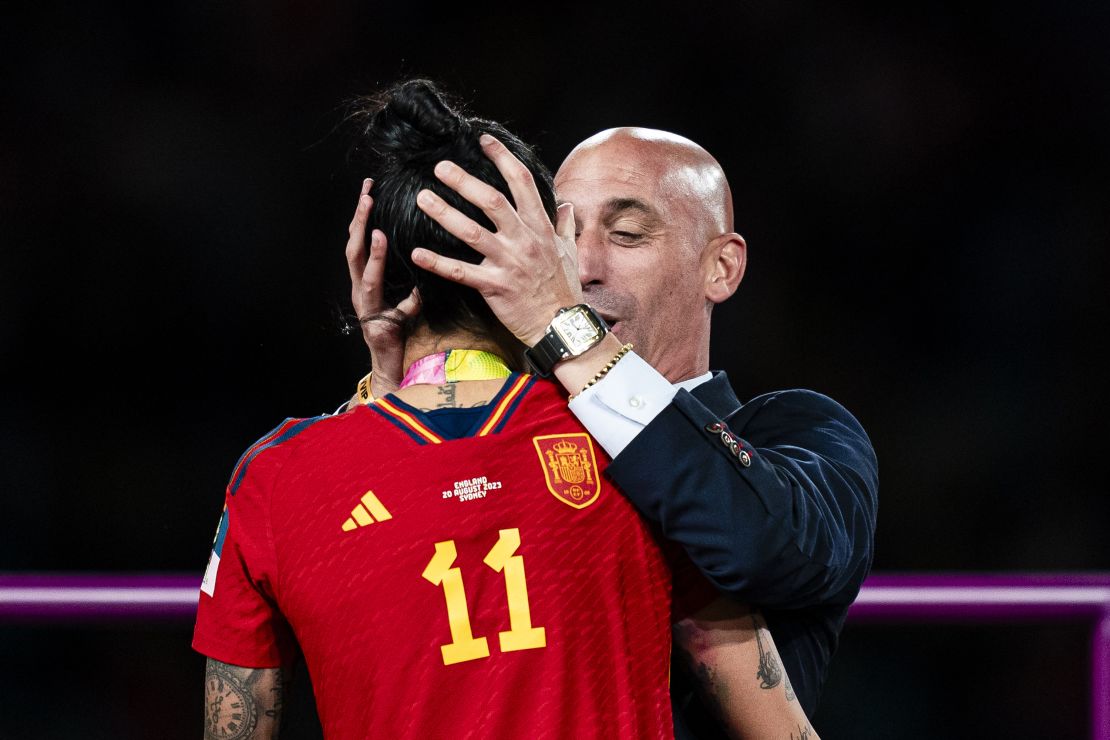Editor’s Note: Holly Thomas is a writer and editor based in London. She is morning editor at Katie Couric Media. She tweets @HolstaT. The opinions expressed in this commentary are solely those of the author. View more opinion on CNN.
It’s been more than a week since Spain’s historic victory over England in the Women’s World Cup final, and the woman now on everyone’s lips was nowhere near the pitch that day.

The spotlight is on Ángeles Béjar, the mother of Royal Spanish Football Federation (RFEF) president Luis Rubiales. Rubiales has been suspended by FIFA, soccer’s world governing body, after giving an unwanted kiss on the mouth to star player Jennifer Hermoso at the medal ceremony.
Rubiales has described the kiss as “mutual,” whereas Hermoso said on social media she was the “victim of an impulse-driven, sexist, out of place act without any consent on my part.” Spain’s winners are refusing to play for the team until the current leadership is gone, Spanish prosecutors have opened an investigation into the incident and Spain’s football federation had at one point accused Hermoso of lying (regional soccer chiefs have since held an emergency meeting and called for Rubiales to step down).
Outraged by what she’s called an “inhumane, bloodthirsty hunt” of her son, Béjar has locked herself in a church in the Spanish city of Motril near Granada, where she’s promised to stay “indefinitely, day and night” until justice is served. Her protest marks the strangest escalation in a row that’s seen a man’s decision to impose himself on a woman supersede the high point of that woman’s career. His failure to offer a meaningful apology confirms the suspicions of everyone who believed that, for all the goodwill it’s received lately, women’s soccer remains the poor sister of the men’s game — and it’ll take more than a superficial cultural makeover to change that.

Rubiales’ retrograde behavior and subsequent primacy in the news cycle are especially gutting considering how well things appeared to have been going for the sport. As a ’90s kid lacking any particular interest in sports, my first impressions of soccer were informed by the glut of super-highly paid male players who ruled the scene at the time. My earliest memories concern the then-legendary British player Paul Gascoigne, known as “Gazza.”
Gazza, literally intoxicated by his miraculous success, was notorious for his disturbing and often aggressive behavior on and off the pitch, which he has written about publicly in a memoir and spoken about in a documentary. His dominance on tabloid covers affirmed my preconceptions of his profession as equally brutish: one best suited to the baying men who overtook the stands on match day and drunkenly flooded the streets afterward. Britain’s football hooligans and their racist and often violent tendencies were infamous at home and abroad, but they were also an intrinsic part of the game. I knew I wasn’t welcome.
The fans’ willingness to forgive Gazza, coupled with the rise of the acronym “WAGs” to describe the players’ wives and girlfriends solidified my impression of soccer as a game for men played, if necessary, at women’s expense. Where I grew up in southern England, women’s soccer was a (usually homophobic) punchline. FIFA finally got around to instituting the first Women’s World Cup in 1991 (the first men’s tournament was in 1930) — but while classes were paused to watch the men’s England team take on Brazil in the 2002 quarterfinals, women’s contests passed by unnoticed. Girls did not play soccer at my school, and it would never have occurred to me to seek out a women’s match on my own time.
Fast forward a few decades. In 2015, the US women’s soccer team became the first group of female athletes to receive a ticker tape parade in New York City following their World Cup victory over Japan — an honor awarded to them again after their victory over the Netherlands in 2019. Women’s transfer fees, albeit still a fraction of the men’s, are at an all-time high, and this year’s World Cup showdown between Spain and England drew record viewing figures. For her 10th birthday this summer, my boyfriend’s niece’s number one wish was to watch a soccer match.
He bought her and half the family (plus me) tickets to the Women’s Champions League semifinal second leg for Arsenal vs. Wolfsburg. Even a few years ago, it wouldn’t have been worth opening the stadium for the game as the turnout was typically woeful, but on that evening, the 60,700-capacity venue was sold out. In the row in front of us, a man sat with his two young sons cheering Arsenal on, a delightful scene that would’ve been unthinkable when I was a child. The players took checks from the referee on the chin and the temperance on the pitch was mirrored in the stands; there was no abuse thrown at the opposition, no crush as we exited.
Get Our Free Weekly Newsletter
- Sign up for CNN Opinion’s newsletter
- Join us on Twitter and Facebook
All of this was undeniably lovely. However, our rose-tinted day out was only possible because the total cost of our tickets came to a little more than $100. For comparison, tickets to an equivalent men’s game would’ve set us back closer to $1,000. Men’s football may be becoming more inclusive and the players less loutish, but there’s no doubt which sport is the main event.
Women’s football may have won the hearts of the public to an unprecedented degree in the last few years, but evidently, popularity alone doesn’t ensure equal standing in the eyes of those who run the show. Béjar’s bizarre demonstration over her son and the RFEF’s initial disgraceful knee-jerk assertions in his defense have nothing to do with justice, and everything to do with ego. If Rubiales had simply apologized for what he’d done right away, it would still have been wrong, but at the very least, he might have ceded the limelight to the Spanish women’s team where it belongs. In digging his heels in, he’s revealed the misogynist heart still beating beneath football’s skin.




